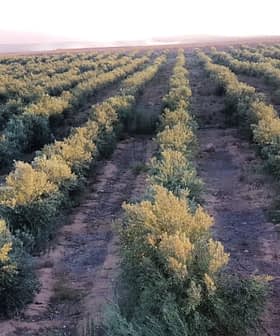One thousand olive producers in Lebanon recently attended a mechanical harvesting workshop organized by the U.S. Agency for International Development (USAID). Participants included representatives from 18 partner cooperatives and 60 companies from across the country.
The workshop was part of a five-year project of the 41.7‑million-dollar Lebanon Industry Value Chain Development (LIVCD) project financed by USAID which aims to improve economic stability in Lebanon by encouraging small businesses and creating jobs for women and youth. One of its objectives is to improve and increase the competitiveness of the country’s “Olive Oil Value Chain.”
Many Lebanese products and services are less competitive than they could be, an audit of the program found, primarily because “15 years of civil war have damaged infrastructure and depressed investment.”
“Agricultural practices in Lebanon’s olive sector had remained fairly traditional, including labor-intensive manual harvesting,” the USAID says in a Success Stories section of its website, “which can incur over half the costs of the already expensive production process. These excessive costs negatively affect the competitiveness of Lebanese growers domestically and in export markets where, compared to olive oil from other countries, Lebanese products can be 15 to 30 percent more expensive.”
The goal of the program is to improve productivity in olive orchards and reduce harvest and production costs. Under the program, producers can rent mechanized harvesting equipment from cooperatives at the cost of $20 a day. The harvesting tool consists of a rake running on a 12-volt battery which vibrates, causing olives to fall to the ground. The tool saves time, reduces the cost of harvesting and prevents the broken branches often cause by hand-harvesting according to the project organizers.
Plastic crates and tarpaulins, which are laid on the ground to catch the falling olives, are also available under the program.
In 2013, the first year of the program, LIVCD had provided 29 tools to six cooperatives in the regions of Koura, Batroun and Akkar. Last year this extended to 18 cooperatives, where 123 equipment kits were distributed. In 2014, 853 farmers and producers used the tools. Managers were trained to work in the offices of the cooperatives in rural areas, creating 73 jobs. The objective for 2015 is to reach 30 cooperatives.



